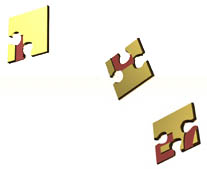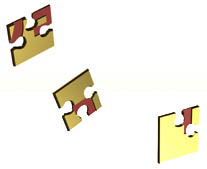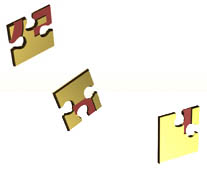What's
Happening in Other States
Defining the Role of Paralegals
Para-legal: an individual qualified through education and
training, employed or retained to perform substantive legal work and
supervised by a lawyer licensed to practice law in this state, requiring
a sufficient knowledge of legal concepts that, absent the paralegal, the
attorney would perform.
By Dianne Molvig
| What is the role of paralegals in the legal
community? A State Bar task force grapples with this complex issue,
considering what skills paralegals should possess, whether paralegals
should be supervised and by whom, and if they should be regulated and by
what agency. But first the task force had to define what is and is not a
"paralegal." |
To many onlookers, it may have seemed a recipe for gridlock. Take a
collection of lawyers from diverse practice settings: large firms, small
firms, corporate legal departments, government offices, and legal
services agencies. Add several paralegals who hold conflicting views
among themselves as to how to improve the stature of their profession.
Then mix everyone together to create the State Bar's Paralegal Practice
Task Force, asking it to examine questions that have long stirred
controversy among both attorneys and paralegals: What is the role of
paralegals in the legal profession? What qualifications should they
bring to the job? And what exactly is a paralegal anyway?
"If you'd have asked me three years ago if we had a chance of coming
up with solutions, I probably would have said, 'no, we don't have a
prayer,'" confesses Pam Barker, Milwaukee attorney and chair of the task
force. That feeling lingered, she notes, even after the group's first
few meetings. Clearing the air had to be an initial order of
business.
"During the first year we spent a lot of time just in debate," she
says. "We had to get comfortable in trusting each other because this is
such a controversial issue. And people hold very strong views and have
different perspectives."
 Barker's earlier doubts have since given way to optimism.
"For about the last year-and-a-half," she says, "we've been working very
well together on moving things forward. I think we're going to come out
with an excellent work product. I've been astounded by the amount of
energy people have put into this - because they believe in it. The
lawyers believe in it. The paralegals believe in it."
Barker's earlier doubts have since given way to optimism.
"For about the last year-and-a-half," she says, "we've been working very
well together on moving things forward. I think we're going to come out
with an excellent work product. I've been astounded by the amount of
energy people have put into this - because they believe in it. The
lawyers believe in it. The paralegals believe in it."
The finished product, in the form of a final report to the State
Bar's Board of Governors, is still months away, as the task force has
yet to resolve several key issues. Task force members aren't kidding
themselves, however; they know that even after they've completed and
submitted their report, the debate over paralegals may rage on in the
Bar for some time to come. Meanwhile, many lawyers would rather not
grapple with the paralegal issue at all, preferring that it simply go
away.
"The fact is we're going to need to deal with this in one fashion or
another," Barker contends. "We can do it the way we're doing it now,
which is to come up with what we think is the best of all worlds for
everybody. Or we can go back to where we were three years ago when
paralegals went to the Legislature to try to get (a licensing bill)
passed on their own. Then we'll be fighting this out on a political
playing field rather than working together through the State Bar to come
up with solutions."
The push by paralegals for a licensing bill was one of two driving
forces that once again brought the topic of paralegals to the fore. The
other factor was a recommendation that came out of the State Bar's
Commission on the Delivery of Legal Services. In its 1996 report, the
commission advised the Bar to further study what role paralegals might
play in meeting the legal needs of the unserved among the general
public. The Paralegal Practice Task Force was a direct outgrowth of that
recommendation.
First things first
Task force members soon realized that their first hurdle was to agree
on terminology. Currently, the word paralegal is tagged onto job
descriptions that may differ considerably from one law practice setting
to another. Rather than using the word paralegal, the American Bar
Association prefers the term legal assistant to describe the same sort
of position. In some firms, neither paralegals nor legal assistants
exist, but someone on staff, perhaps called a legal secretary, actually
does paralegal work. To further cloud the definition issue, there is
what's come to be known as the legal technician, highly suspect in legal
circles, who carries out paralegal work without any supervision from an
attorney.
Although the ABA considers paralegal and legal assistant to be
synonymous terms, "several law firms now have both paralegals and legal
assistants, and they differentiate between the two," says Lynn Retzak,
paralegal program director at Lakeshore Technical College in Cleveland,
Wis. "They'll have paralegals, and then instead of legal secretaries,
who don't like being called that anymore, they'll have what they call
legal assistants. You see the confusion?"
 In an attempt to clear up that confusion, a task force
subcommittee, after much discussion and debate, hammered out the
following definition:
In an attempt to clear up that confusion, a task force
subcommittee, after much discussion and debate, hammered out the
following definition:
"A 'paralegal' is an individual qualified through education and
training, employed or retained to perform substantive legal work and
supervised by a lawyer licensed to practice law in this state, requiring
a sufficient knowledge of legal concepts that, absent the paralegal, the
attorney would perform."
A footnote to the above clarifies that the definition assumes a
"grandfather clause" for work experience, which is not specifically
addressed in the definition itself. The grandfather clause, still not in
final form as of mid-October, will speak to the need to give paralegals
out in the field, who may not have had formal education and training,
the credit they deserve for working their way up through the ranks and
learning on the job.
Applying the task force's definition to new people entering the field
is a much easier matter than figuring out how to bring existing
paralegals under the definition. That's made writing the grandfather
clause something of "a quagmire," points out Shawn Olley, a task force
member and owner of Milwaukee-based Midwest Paralegal Services, which
offers freelance paralegal services to attorneys. "It is difficult for
us to come down and say, 'this is what makes a paralegal,'" she
explains, "because there are so many different stories out there (among
paralegals already in practice). But we need to do that now, so that
five or six years from now, we don't have that problem anymore."
In addition to the definition, the other major piece completed by the
task force so far is a set of proposed ethics rules for paralegals.
These comprise a 16-page document that is based on SCR 20, the Wisconsin
Supreme Court ethics rule for attorneys. Portions of that rule were
extracted and adapted as appropriate. "We felt (SCR 20) would be a good
starting point to see what kinds of ethics rules should apply to
paralegals," says Frank Remington, a state Department of Justice
attorney and a member of the task force's ethics subcommittee, "bearing
in mind that we needed to make modifications clearly reflecting the fact
that paralegals are working under the supervision of attorneys."
Fear of shingles
 The portion of the task force's definition of paralegal that
will jump out most to attorneys' eyes consists of four words: supervised
by a lawyer. That phrase is key to the task force's approach, say
members. "We are not working to create a group of people who will
compete with lawyers in the practice of law," emphasizes Remington, "but
rather to create a system that reflects what is really going on already.
That is, paralegals are assisting lawyers in the practice of law.
Paralegals serve a function, but that function always is carried out
under the supervision of a lawyer."
The portion of the task force's definition of paralegal that
will jump out most to attorneys' eyes consists of four words: supervised
by a lawyer. That phrase is key to the task force's approach, say
members. "We are not working to create a group of people who will
compete with lawyers in the practice of law," emphasizes Remington, "but
rather to create a system that reflects what is really going on already.
That is, paralegals are assisting lawyers in the practice of law.
Paralegals serve a function, but that function always is carried out
under the supervision of a lawyer."
Paralegals on the task force echo Remington's words, even though they
historically have disagreed on various issues. Two professional
organizations represent the state's paralegals: the Madison Area
Paralegal Association and the Paralegal Association of Wisconsin, which
has chapters in Milwaukee, Madison, the Fox Valley, and Racine/Kenosha,
plus an ad hoc chapter in Wausau. The latter association is the one that
pursued legislative action to license paralegals in 1995, while the
Madison Area Paralegal Association opposed licensing on the grounds
that, because it felt paralegals should always work with attorney
supervision, licensing was unnecessary.
But even with its pursuit of licensing, the Paralegal Association of
Wisconsin never sought to push for paralegals' independence from
lawyers, says John Goudie, the group's president. "Our intent was to
formalize the profession," Goudie says. "There are no formal standards
of practice for paralegals anywhere in the United States. And we felt it
was time they were needed." Goudie acknowledges, however, that the
impression persists among many in the legal community that his
organization's legislative goal was to win the right for paralegals to
practice independently of lawyers - an impression perhaps fostered by
the fact that no one outside of the Paralegal Association of Wisconsin
actually saw the draft of the licensing bill, which never was introduced
in the Legislature.
 But even with its pursuit of licensing, the Paralegal
Association of Wisconsin never sought to push for paralegals'
independence from lawyers, says John Goudie, the group's president. "Our
intent was to formalize the profession," Goudie says. "There are no
formal standards of practice for paralegals anywhere in the United
States. And we felt it was time they were needed." Goudie acknowledges,
however, that the impression persists among many in the legal community
that his organization's legislative goal was to win the right for
paralegals to practice independently of lawyers - an impression perhaps
fostered by the fact that no one outside of the Paralegal Association of
Wisconsin actually saw the draft of the licensing bill, which never was
introduced in the Legislature.
But even with its pursuit of licensing, the Paralegal
Association of Wisconsin never sought to push for paralegals'
independence from lawyers, says John Goudie, the group's president. "Our
intent was to formalize the profession," Goudie says. "There are no
formal standards of practice for paralegals anywhere in the United
States. And we felt it was time they were needed." Goudie acknowledges,
however, that the impression persists among many in the legal community
that his organization's legislative goal was to win the right for
paralegals to practice independently of lawyers - an impression perhaps
fostered by the fact that no one outside of the Paralegal Association of
Wisconsin actually saw the draft of the licensing bill, which never was
introduced in the Legislature.
Now, as before, Goudie says, his organization's position - like that
of the Paralegal Practice Task Force - is that paralegals should be
working with attorneys. "We're not talking about paralegals hanging out
their shingles, about providing services directly to the public," he
says. "We're setting standards to assure that the paralegals who are
providing legal services with the supervision of attorneys are qualified
to do so. We see that as being important to our profession, and we think
it can be beneficial to the delivery of legal services in Wisconsin.
That's the key focus here."
Still, the fear runs deep that by taking steps to officially
recognize paralegals, attorneys will set the stage for future
competition. Give paralegals sufficient stature, so the argument goes,
and soon they will be running their own businesses, with lawyers cut out
of the picture.
Waukesha attorney and task force member Cornelius (Casey) Andringa
takes an opposite view: Continue to avoid dealing with the place of
paralegals in the legal profession, and they most certainly will become
competitors. "I liken it to the days when doctors stuck their heads in
the sand about chiropractors," Andringa says. "The chiropractors went
their own way, and now they are totally independent. Had doctors
acknowledged that chiropractors perform a service, and tried to
coordinate with them, we all might have been better off for it."
If the Bar fails to recognize the crucial role of paralegals, they
will look elsewhere for validation, such as once again pursuing
licensing through the Legislature, Andringa predicts. That would bring
paralegals under the control of the state's Department of Regulation and
Licensing, which Andringa feels "would be the wrong way to go. I don't
think paralegals should be licensed like barbers and plumbers. What
would be their code of conduct? What would be their disciplinary
structure?"
Better to bring paralegals under the jurisdiction of the Wisconsin
Supreme Court, Andringa contends. "Paralegals are part of our
profession," he says. "So let's get them inside the fold, where the
supreme court and the Bar have some influence over their work, which is
so closely related to ours. It's really part of ours."
 More work in progress
More work in progress
Besides the completed paralegal definition and code of ethics, and
the grandfather clause still being written, another key component of the
task force's work is the educational criteria - covering both training
for paralegals entering the field and continuing education for those
already practicing.
Not all paralegals agree in this area, either. Many view educational
requirements as a quality control measure for their profession. Others
see such requirements, especially continuing education, as just more
hoops to jump through in order to keep doing the job they're already
doing.
"I think we're looking at the integrity of the profession," says
paralegal instructor Retzak, chair of the task force's education
subcommittee. "As an educator, I believe in lifelong learning, and this
is one way to ensure that."
Paralegals themselves stand to gain from having clear educational
standards, says Retzak. "The profession is growing," she notes, "and
there have been lots of training programs coming out over the Internet
or in videotape - the 'weekend wonders' as we call them. You watch 20
hours of videotape, and now you're a paralegal. But we find the quality
of education is not there. People are being taken advantage of, and
attorneys don't know the difference" when they hire someone claiming to
be a paralegal. In fact, as matters now stand, nothing can stop people
who have had absolutely no paralegal training from calling themselves
paralegals and offering their services in the marketplace.
Educational standards would help ensure that those who claim to be
paralegals have indeed completed proper training, thus protecting those
who do go to the trouble and expense to attend school - as well as
giving attorneys a better idea of what they're getting when they hire a
paralegal. In the end, this also becomes a question of consumer
protection. Clients have the right to know that the paralegals their
attorneys are using - and for whose services they're being billed - are
qualified.
But, some attorneys would argue, how can you devise training
standards for paralegals who ultimately may do totally different kinds
of work in different settings: small firm or large, rural or urban,
private practice or government agency? "How do attorneys do it?" Retzak
counters. "It's the same thing. When (paralegal) students graduate, even
from a four-year degree program, they still need additional on-the-job
training - just like attorneys do" when they leave law school. In fact,
her institution, Lakeshore Technical College, recommends, but does not
require, that paralegal students serve internships, much like law
students work as law clerks, to better prepare them for the world of
work.
As for her subcommittee's final recommendations, still taking shape,
Retzak says they're likely to address quantity of education, but not
specifics about what types of courses that should include. "The
consensus seems to be that for Wisconsin, a two-year degree is adequate
because we're such a rural state," she explains. "We recognize in larger
cities, such as Milwaukee, Madison, or Green Bay, a lot of firms may
prefer four-year degrees" for their paralegals.
 The sum of the parts
The sum of the parts
Once the task force has finalized a definition, grandfather clause,
code of ethics, and educational requirements - challenging work in
itself - then comes the even more difficult work. "After we have all the
pieces," says chairperson Barker, "then we need to fit this all together
to come up with an overall structure." That leads to numerous questions.
What will be the disciplining body for paralegals? An arm of the Board
of Attorneys Professional Responsibility? Or a completely separate unit?
Might the Board of Bar Examiners, or an equivalent, handle some sort of
licensing or certification process for paralegals?
So that these boards aren't surprised later, representatives from
both have been involved in task force discussions, as nonmembers. "It's
a little chicken and egg," Barker admits, "because obviously they can't
really get into this and decide what to do with it until they know what
we're going to recommend. But we've had good dialogue with
representatives from both boards. Our goal is to have them comfortable
with whatever we recommend, so that ultimately if and when the Bar goes
to the supreme court with a proposal, we'll be speaking with one
voice."
The question remains as to whether a proposal ever will reach the
Wisconsin Supreme Court. First the task force must submit its report to
the Bar's Board of Governors and win support there. Knowing the
years-long history of controversy and conflict over this issue, task
force members are realistic about their chances, yet hopeful that, at
last, real progress might be made in bringing paralegals and attorneys
to the same side of the table, rather than on opposite sides.
"What we're going to give to the Bar as a whole is what this group -
this very diverse group - believes," says Christine Ouimet-Durow,
past-president of the Madison Area Paralegal Association. "We've put a
lot of work into this - into the definition of a paralegal, the rules of
ethics, the educational requirements. We will have done the
legwork."
Dianne Molvig operates Access Information Service, a Madison
research, writing, and editing service. She is a frequent contributor to
area publications.
Wisconsin Lawyer
